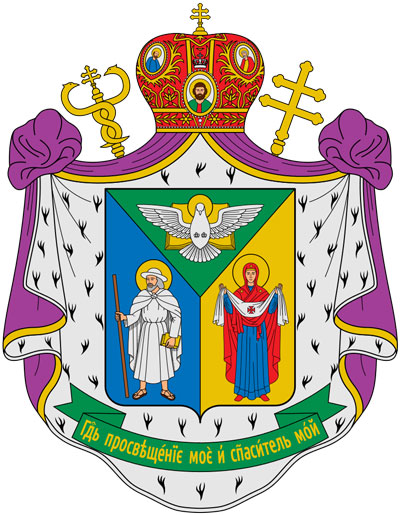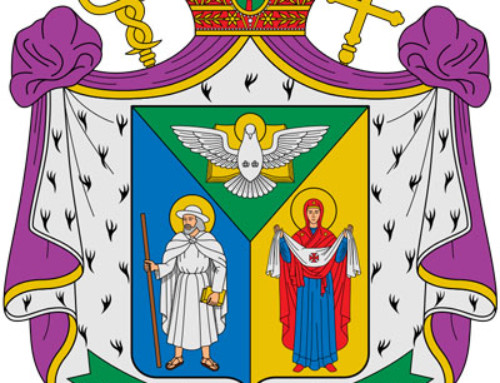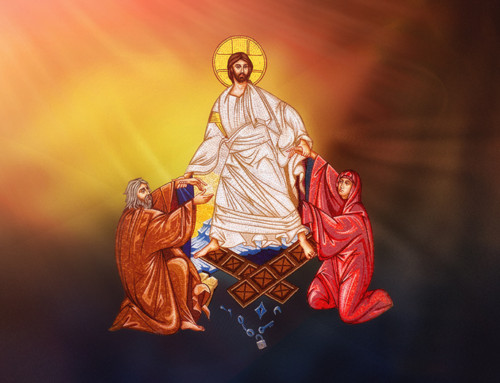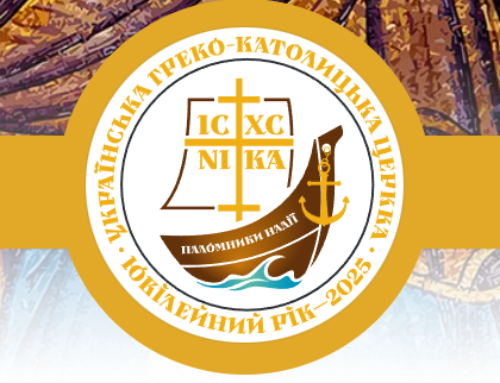ENCYCLICAL OF THE SYNOD OF BISHOPS OF THE MAJOR ARCHBISHOPRIC OF KYIV-HALYCH OF THE UKRAINIAN GREEK CATHOLIC CHURCH CONCERNING THE DANGER OF GENDER IDEOLOGY
Dearly Beloved in Christ!
Introduction
- In the twentieth century, the people of Ukraine suffered from a godless Soviet regime that attempted to forcefully tear people from the roots of faith and impose an atheistic worldview. Presented as the only “scientific” one, this worldview denied human persons’ freedom of conscience and deprived them of the right to freely profess their religious beliefs. At the beginning of the twenty-first century, the world stands before similar challenges, which, however, are not accompanied by open and bloody persecution, but rather are served by hidden ideological means of destroying Christian faith and morality, as well as universal human values. Some of these challenges relate to areas of human sexuality and family life, and are not new to Ukraine; rather, they are accented or presented in public consciousness in a new manner. Others are entirely new and even far removed from the Ukrainian context, but certain forces are attempting to artificially impose them upon us.
- In particular, gender theories are a significant threat today, attempting to destroy the perception of human sexuality as a gift from God that is naturally linked to the biological differences between man and woman, as well as introducing a dangerous disorder to human relationships and attacking the foundations of interpersonal communication. The concepts of human dignity and freedom are undergoing extensive manipulation and the true meaning of these essential moral categories is being displaced and distorted. All these efforts are being implemented very actively, systematically, and thoughtfully, using political expediency and populist slogans. However, their true nature and purpose remain hidden from the public. As a result, Ukrainian society—sensitive to asserting its dignity and freedom—is in danger of thoughtlessly accepting as truth questionable atheistic theories founded in attempts to affirm human dignity, to achieve equality among people, to defend the human right to freedom, and so on.
- Under these circumstances, the Church-Mother seeks by means of this Encyclical to warn the faithful and all people of good will of the threats that are hidden behind gender ideology and similar worldview systems, and recall the traditional biblical, Christian, and universal values upon which interpersonal relationships and the way of organizing social life are based.
- Human Dignity in God’s Plan
- The whole history of salvation attests to the incredible love of God for the human person. From the very first pages of Holy Scripture we learn about the extraordinary greatness of the human person. While everything else arose from only one word of God, Church tradition speaks of a Divine “meeting” that preceded the creation of the human person: “Then God said, ‘Let us make man in our image, after our likeness’” (Gen. 1:26). Particular attention should be given to the phrase “in our image, after our likeness.” This is the basis of the concept of human dignity, which in the New Testament is emphasized in the Incarnation of the Son of God in human nature. The image of God is integral to the natural dignity and spiritual beauty of every human person, from the moment of conception until natural death. This is a common feature of all people that reflects their equal and infinite value.
- The image of God is the foundation of not only personal uniqueness, but also the human community: “Then God said, ‘Let us make man in our image, after our likeness’…So God created man in his own image, in the image of God he created him; male and female he created them” (Gen. 1:26–27). Therefore, the “communion of the persons of the Trinity is the prototype of the human community.”[1] Pope Francis, commenting on this verse of Holy Scripture, says that “marriage is the most beautiful creation of God” because “man and woman, who become one flesh, are the image of God.”[2] “Man is a person, man and woman equally so, since both were created in the image and likeness of the personal God. Each of the two sexes is an image of the power and tenderness of God, with equal dignity though in a different way.”[3] The catechism Christ – Our Pascha, interpreting the biblical story of the creation of man and woman, says: “The image of the Most Holy Trinity in human community is the natural unity of human community that exists within the communion of the love between Adam and Eve. Complementing one another physically, psychologically, and spiritually, Adam and Eve are different, but at the same time, equal persons. In the wonderful image of Eve’s creation from the ‘rib of Adam’ (cf. Gen. 2:21), Holy Scripture describes the equality and difference between the man and the woman, who form the first community. Adam professes Eve to be his own: ‘This at last is bone of my bones and flesh of my flesh; this one shall be called Woman” (Gen. 2:23). Adam embraces Eve as person, his equal and simultaneously his companion for life (cf. Gen. 2:24).”[4] The Church teaches that “created in the image of the one God and equally endowed with rational souls, all men have the same nature and the same origin. Redeemed by the sacrifice of Christ, all are called to participate in the same divine beatitude: all therefore enjoy an equal dignity.”[5]
- Sexuality, as a gift to be man or woman (cf. Gen. 1:27) given by God during creation, integrally covers all the natural dimensions of existence of the human person: body, soul, and spirit. A person is called to accept God’s plan for themselves as expressed in their sex—because sex does not depend on human choice—and to embody it in their lives. Sexuality can only be comprehended in light of the Christian understanding of love as a vocation to the communion of persons and the self-giving of one person to another. “In marital life, a man and a woman open themselves to God through mutual love, which becomes the foundation of their indissoluble union, fidelity, and fruitfulness. In the virginal state of consecrated life, sexuality is transfigured in the Holy Spirit in order to serve God and one’s neighbour in love for the sake of the heavenly kingdom (cf. Matt. 19:12). Any selfish exploitation of another person as a means for obtaining sexual pleasure contradicts God’s gift of love, deforms the essence of sexuality, and deeply wounds the person.”[6]
- God subjects the earth and all that fills it (cf. Gen. 1:26,28) to the human person. This is why human beings are God’s greatest creation, which has a special vocation and mission in the world.[7] The Psalmist describes the greatness and dignity of the human person: “For I will look at the heavens, the works of your fingers, the moon and the stars which you fixed. What is man that you remember him? Or the son of man that you visit him? You have made him a little less than the angels; you have crowned him with glory and honour, and set him over the works of your hands.
You have subjected all things under his feet…” (cf. Ps. 8:4–9). And St. John of Damascus, a Father of the Church, emphasizes that God created man as “a sort of second microcosm within the great world, another angel…king over the things of earth, but subject to a higher king, of the earth and of the heaven, temporal and eternal, belonging to the realm of sight and to the realm of thought, midway between greatness and lowliness, spirit and flesh…becomes deified by merely inclining himself towards God; becoming deified, in the way of participating in the divine glory and not in that of a change into the divine being.”[8]
- In God’s plan, the human person, created in the image of God, is appointed for eternal communion with the Creator. As St. Gregory of Nyssa says, “the purpose of a virtuous life is to become like God.”[9] With the Lord’s grace, a person reaches the height of its capabilities in likeness to God through “divinization” (theosis).[10] The Apostle Paul describes the outlook and purpose of human growth: “…until we all attain to the unity of the faith and of the knowledge of the Son of God, to mature manhood, to the measure of the stature of the fullness of Christ” (Eph. 4:13). Every human person in its growth toward the fullness of God’s likeness is an absolutely unique and inimitable individual. This inimitableness is caused by the grace of the Holy Spirit, who endows each of us with special personal gifts, talents, abilities, and disposition. Thus, the equality of all people in their dignity is at the same time inextricably linked to the uniqueness of each human person.
- One of the features inherent in God’s image in the human person is free will, by which it can freely choose the good; however, it is also able to choose another way: “The most profound dimension of human freedom consists in being able to freely choose God and to be with him. This is the good. Yet with this same freedom, we can also reject our relationship with God—and this is evil.”[11] “The devil in Paradise lured Adam with a vain hope for divinization, proposing that he consider the measure of goodness resides not in God but within himself…The deceit of the Evil One is based on the premise that God is deceiving humankind with his commandment, thereby undercutting their freedom…”[12] From the biblical account of the fall of the progenitors, we conclude that a sinful choice has serious consequences for the person—the loss of paradise as a state of blessed communion and life with God and other creatures (cf. Gen. 3:4–14). The sin of the progenitors also obscured the truth about the human person as the image of God. Since then, human nature has also been marred by sin. The brokenness caused by sin continues in history, appearing in a variety of abuses in the area of sexuality.
- But God so loved man that he did not abandon him, he did not take away from him his high calling even after the fall, but is constantly looking for him: “Adam, where are you?” (cf. Gen.3:9). Because of the fall, man’s movement toward God ceases, but God does not cease his movement toward man. Evidence of this is the history of salvation, as reflected in the Old Testament. Direct restoration of this movement was accomplished in the New Testament through Christ, who “gave himself as an exchange to death, by which we had been held captive, sold under sin. And when He had descended through the Cross into Hades, so that He might fill all things with Himself, He loosed the pangs of death. And rising on the third day and making a way for all flesh to the resurrection of the dead….”[13]
- Thus, the dignity and worth of man lies in the truth of his creation “in the image and likeness of God,” in its superiority over all creation and comprehension of the divine vocation to holiness. God’s likeness, in which man was created, points to the dynamism of his vocation. The dignity of man requires that he act not under the influence of instinctive impulses or external coercion, but under a conscious and free choice and mature personal convictions. This is reached when one is freed from the bondage of passions and aims for his goal, freely choosing good and using appropriate means for it.[14]
- The Concept of Gender
- Human sexuality is, as already mentioned, a natural gift of God and precisely through it we discover the joy of being co-creators. However, the very vulnerable area of sexuality and marriage today belongs to the most manipulated aspects of human existence. The constant temptation to violate God’s statutes in this area is one of the consequences of the fall of our progenitors (cf. Gen. 3). Man abuses the possibility of a free choice when trying to “become free” of traditional values in the area of sexuality and married life, falsely treating them as some archaisms and obstacles to equality, dignity, and freedom. Some believe that obstacle to be biological sex, perceiving difference of sexes as the cause of societal degradation and violation of rights, the precondition for sexual violence in the family and outside it (by men against women). Instead, it should be remembered that the cause of these and other such societal problems is not sexuality itself, but its distorted perception and understanding.
- Over the course of millennia, humankind has recognized the existence of two sexes based on biological criteria—male and female. Recently, worldviews that are contrary to the Christian faith, objective scientific reality, and natural law have become widespread and influential, namely theories of gender. Their basis is the distinction between biological sex, given to the person from conception, and gender, a certain personal choice of sexual behaviour. Consequently, gender identity is no longer considered a gift from God, but rather declared a matter of individual choice for each person. The person ”no longer understands its deep calling to eternal love, but considers it as a temporary diversion.”[15] While sexual identity is based on a biological, psycho-physical reality, gender identity abandons binary gender (male or female) in favour of a broad and free range of self-identification. Thus, sex is a natural phenomenon, whereas gender is the reality of psychological self-understanding often caused by social influence. Gender ideology insists that a person is free to choose and implement their sexual identity regardless of their biological sex. Such separation and opposition of sex and gender is dangerous, because it distorts the traditional foundations of society based on divine and natural law.
- The concept of gender is constantly changing and transforming. If initially it was “constructed” in opposition to biological sex, indicating that a person could choose a gender (social) role of man or woman regardless of being physiologically male or female, it is now claimed that not only does biological sex not influence the choice of social role, but the public role of man or woman is not necessary. Because gender is entirely separated from binary biological sex, it can be determined by any differences in behaviour, biological characteristics, psychological characteristics, sexual drive or desire, and so on. The human person is understood as a kind of “incorporeal freedom” that is its own creator and constructs its own identity, including its physicality in sexual terms, as a tool for getting the most pleasure with the least responsibility.
- This “theory” implies that everyone can have a gender based on a unique combination of characteristics, freely defined and given by that person itself. Gender can supposedly be chosen. Therefore, people are likely to choose one that matches their biological sex. But one can also choose a different one. The person is given the offer not to limit their biological sex to man or woman, or even the social role of man or woman, but instead to choose their gender and gender role from the plurality of possibilities (various gender ideologues identify from a few to dozens of such roles, for example, heterosexual, homosexual, transsexual, androgynous, bigender, agender, etc.). Thus it is not being someone that determines, but acting in the role of someone. In addition, gender is declared not as a static reality but a dynamic one that can be repeatedly changed throughout the course of one’s life. The consequence of such erroneous thinking is the conclusion that supposedly one can freely choose the ways of one’s own sexual life.
- Of particular concern is the fact that gender ideologies are not just virtual worldview systems—they are aggressively imposed on public opinion, gradually introduced in legislation, and made ever more forcefully visible in different spheres of human life, especially in education and upbringing. “If these ideas circulated only in theory, they would not go beyond the right to private opinion and the possible existence of different philosophical views. The danger lies in the fact that such anti-human theories are trying to become the ruling ideology and be put into practice, sometimes by means of international pressures on the global community.”[16] Pope Francis states that “today a world war is being wagged to destroy marriage,” referring to the theory of gender as “destructive ideological colonization.”[17] That which was until recently considered sexual deviation is today proclaimed by gender theorists as not only normal, but as a rule of life to be followed under pain of ridicule, censure, and even punishment.
- Therefore, at its present stage of development, gender theory begins to acquire the characteristics of totalitarian ideology and is similar to those utopian ideologies that in the twentieth century not only promised to create paradise on earth, supposedly building true equality between people, but also tried to forcibly introduce their own way of thinking, eradicating any alternative point of view. The tragic history of the twentieth century has shown us what such ideologies that promise “happiness to all humanity” turn into.
III. Destructive Outcomes of Gender Ideology
- Gender theories envision the complete denial of human nature and natural moral law, with the result that the concept of human identity is steadily destroyed. Pope Benedict XVI confirms: “What is often expressed and understood by the term ‘gender’ ultimately ends up being man’s attempt at self-emancipation from creation and the Creator. Man wants to be his own master, and alone—always and exclusively—to determine everything that concerns him. Yet in this way he lives in opposition to the truth, in opposition to the Creator Spirit.”[18] Supporting gender theory, a person rejects the idea that his or her gender is granted by God and doubts the fact that God created people as male and female (cf. Gen. 1:27).
- Gender theory denies the existence of human beings created as men and women, claiming that only the person has the ability of self-creation (self-transformation) into man, woman, or some other being. Therefore, it is not God, but the person who is proclaimed creator of man, woman, or some other being. Officially declaring the desire for equality, gender ideological systems in reality strive for uniformity. We should remember that equality should not be confused with uniformity. It is diversity that is the basis of equality, while uniformity is the basis for smoothing and unifying unique and specific natural traits and signs that are attractive to the sexes. Objecting to biological sex blurs the notion of humanity, which is expressed in masculinity or femininity; rather, sexuality gives the opportunity to build genuine social equality. One cannot simply be a human being—a human being is always either man or woman.
- Gender ideology, which denies the existence of objective human nature, the complementarity of man and woman, and the values of marriage, actually denies the existence of the Creator and negates the truth of humans in his image. In such ideologies, there is no place for God, and therefore there is no place for the person in their uniqueness and dignity, because human uniqueness is grounded in its connection with the Creator. The biblical doctrine of the person, created by God, emphasizes the greatness and dignity of its origin and calling—from God and eternal life with him in holiness (divinization), while, according to gender theory, the person has a base origin and lowly potential—from itself and for temporary life, with a goal of its own pleasure. Therefore, one can say with conviction that gender theory is destructive and anti-human.
- In addition to the fact that gender ideology clearly contradicts the teaching of Holy Scripture and Christian anthropology, it also does not correspond to objective scientific data, and is instead based on subjective hypotheses and pseudoscientific assertions made by interested parties. Objective researchers have concluded that gender ideologues ignore results of scientific research, medicine, psychology, anthropology, and bioethics that show the difference between men and women is based on the difference between the structure of the brain, hormonal balance, psychological nature…
- Gender ideology denies the most obvious anthropological reality: people are born male and female, and the natural complementarity of the gifts of the two sexes is an extraordinary richness for all of humanity, which gives hope for progress. Promoting vague and undefined ideas of “gender identity” creates a dangerous psychological instability that leads to absurd conflicts between bodily and psychological sexuality, which naturally stems from the physical.
- Gender theories destroy the concept of family as a community of husband and wife in which children are born and brought up. Adherents of this theory believe that the traditional family—which is based on divine and natural law, expresses the dignity of the human person, and is the foundation of fundamental rights and obligations[19]—is only one possible form of family. And they suggest calling unions of people with different mixes of genders, in which to be a parent means simply to perform a certain role, equivalent to the traditional family.
- Gender ideology promotes many forms of sexual identity and behavior that do not at all correspond to human nature. That is why gender theories lead to promiscuity and further demoralization of society. Such a situation leads to disappointment, anger, and the self-destruction of the human race, because its natural foundations and principles are undermined.
- Proclaiming the Truth of Christ in the Context of an Expanding Gender Ideology
- Ukrainian society is generally not acquainted with gender theories and this permits gender ideology to be quietly and insidiously imposed upon it. Indeed, the promotion and dissemination of this ideology is carried out covertly on various levels – in legislation, information, education, upbringing…. At the same time, indisputable facts about the dangers of gender ideology for mental and physical health, particularly among children and young people—to say nothing of the undermining of the very fundamentals of human and family life that come with such theories—are deliberately passed over in silence.
- In such circumstances, the Church issues a call to deeply and carefully assess the challenges in the field of sexuality and married life, not succumbing to social pressure in these important matters, and to defend human dignity and freedom. We strive to call to mind the truth regarding every human person’s dignity, regardless of sex, race, ethnicity, age, health, etc., that the Church of Christ has constantly and consistently proclaimed for centuries. Christians are called to bring to today’s world the truth about the dignity of the human being created in the image and likeness of God, about the dignity of marriage as a union of love between a man and a woman, and about the dignity of man and woman as they complement each other. We must deepen our knowledge of Holy Scripture and Tradition so that we can grow in faith and so that we know how to argue the Christian position in a secular environment. A Christian cannot afford to live a double life, but must consistently and persistently imitate Christ, embodying in their daily life God’s teaching and God’s laws, which are the only source of genuine human happiness, genuine dignity and freedom. As the Apostle Paul writes: “For the Son of God, Jesus Christ, whom we preached among you…was not Yes and No; but in him it is always Yes” (2 Cor. 1:19–20). We cannot rely on God in some cases, and ignore His commandments and precepts in others. We are called to witness to Christ in all the dimensions of our being. This applies to the private realm, family life, professional activity, the public sphere, political activism, and so on.
- All people of good will should work together to defend the dignity of each person, to affirm their natural and God-given characteristics and freedoms, and also for the full protection and development of the family community on the foundation of God’s revelation, which is the real guarantor of human society’s development and worthy future. “Everyone, man and woman, should acknowledge and accept his sexual identity. Physical, moral, and spiritual difference and complementarity are oriented toward the goods of marriage and the flourishing of family life. The harmony of the couple and of society depends in part on the way in which the complementarity, needs, and mutual support between the sexes are lived out.”[20] At the same time, it is necessary to show greater vigilance and responsibility in order to prevent the spread of pernicious theories, which are the latest forms of ideological enslavement and destruction of the person, the family, and society as a whole.
- It is necessary to delve into the essence of every matter and to recognize the true purpose of certain proposals or appeals, without letting oneself be deceived by that which is presented under the banner of an illusory dignity and freedom, or announced as “necessary steps” to implement a particular geopolitical course of the state. We have to remember that “the state cannot fulfil its functions if it violates the dignity of the individual and the moral principles of society.”[21] A human being cannot betray their vocation and destroy human dignity for the sake of dubious social or political projects, even if these projects are presented as a sign of “progress” and “modernity.” The Catechism of the UGCC Christ — Our Pascha teaches that “the criterion of the lawfulness of state power is its conformity to the Lord’s law. When state authority loses its legitimacy through its lack of conformity to God’s law, the people have a right to resist such a government and to oppose it. The Christian is bound to follow divine law even in difficult circumstances: ‘We must obey God rather than any human authority’ (Acts 5:29).”[22]
Conclusion
- The Lord calls people to salvation and the fullness of happiness, giving his Commandments as a guide on our earthly journey. We call the UGCC faithful and all people of good will to value and protect human dignity in the face of new ideological challenges and threats. Each of us is called to this, no matter what our position in society. For this reason:
- we call to mind that “individuals should be endowed with this virtue [of chastity] according to their state in life: for some it will mean virginity or celibacy consecrated to God…. For others it will take the form determined by the moral law, according to whether they are married or single,”[23] and therefore should be properly and responsibly prepare for the choice of their state of life, based on the solid foundation of faith, morality, and divine and natural law;
- we encourage parents to lead a good Christian life that will be an example for their children. Please take care of the Christian education of future generations, not only by transmitting the foundations of faith, but also through all manner of encouragement that they live a life in Christ and by warning them against the dangers of the false exercise of one’s free choice. Parents “are called to be gentle and wise guides. It is they who must lead the child on its path of discovering God’s gift of sexuality in himself or herself, revealing its nature and meaning in a manner appropriate to the age, needs, and depth of the child’s inquiry”;[24]
- we appeal to workers in the field of medicine, remembering that “the most important point of a physician’s oath is to serve human life from the moment of conception and to defend its health,”[25] to promote the dissemination of a culture of life, defending in particular the life of unborn children and the elderly or terminally ill;
- we ask everyone, especially those working in the fields of information and education, to defend and disseminate traditional moral values regarding sexuality and the family, remembering that “nothing can justify recourse to disinformation for manipulating public opinion through the media”;[26]
- we ask all who are responsible for developing educational curricula to prepare them on the basis of natural and divine law, respectful of the truth, the qualities of the heart, and the moral and spiritual dignity of man,[27] avoiding any propaganda against sexual purity, marital fidelity, and the true identity of the human person;
- we call upon scientists to remember that science and technology should recognize the basic criteria of morality and be “at the service of the human person, of his inalienable rights, of his true and integral good, in conformity with the plan and the will of God,”[28] and also encourage them to use available means to demonstrate the truth about gender ideology and other destructive ideologies, and point to the importance of adhering to traditional moral and ethical foundations;
- we remind pastors of their sacred duty to care for the spiritual condition of the family—a community of love and a “domestic church” (cf. Rom 16:5; 1 Cor 16:19; Col. 4:15; Phil. 1:2; Eph. 5:19; Col. 3:16; 1 Tim. 2:8) that is “the primary cell of the Christian community” and “a school of social solidarity”[29] on which a healthy society is built. We also encourage them to accompany families at all stages of their existence, from preparation for married life, through support for young couples, diligent catechesis of families, and special care of families who are experiencing difficulties or crises. In addition, we ask pastors, while maintaining the teachings of the Church and observing a high level of spiritual and psychological maturity, to pay attention to pastoral work with people who have problems with the definition of their own sexual identity;[30]
- we call upon all people of good will, especially government officials and legislators, to be vigilant that the legislation of Ukraine not give way to implementing uncertain and untested concepts of human identity or family, or principles of gender education, remembering that “the ruling authority has as its aim to serve the common good, to preserve and protect the natural and true freedom of citizens, families, and community organizations.”[31] Legislation will only be firm and unshakable when it is based not on temporary and dubious theories, but on the natural law affirmed by divine revelation.
- We invite all to pray that God help us all to live according to his commandments, trusting in his Divine Providence and not succumbing to the temptations of opposing his will. The Lord, having created human beings as “male and female,” looked at them and said that it was very good (Gen. 1:27,31). May he embrace each person and family in his loving and life-giving gaze, confirm us all in his truth and love, and send down upon all his Fatherly blessing!
On behalf of the Synod of Bishops
of the Major Archbishopric of Kyiv-Halych of the UGCC
† SVIATOSLAV
Given in Kyiv
at the Patriarchal Cathedral of the Resurrection of Christ,
on the day of the holy martyrs Plato and Roman,
1 December (O.S. 18 November) 2016 A.D.
[1] Catechism of the UGCC, Christ – Our Pascha, § 132.
[2] “Indifesa delmatrimonio. L’appello durantela visita alla chiesa dell’Assunta a Tbilisi,” L’Osservatore Romano (3-4 October 2016), 6.
[3] Catechism of the Catholic Church, § 2334–2335. Cf. Familiaris consortio, § 22; Gaudium et spes, § 49; Mulieris dignitatem, § 6.
[4] Catechism of the UGCC, Christ – Our Pascha, § 133–134.
[5] Catechism of the Catholic Church, § 1934.
[6] Catechism of the UGCC, Christ – Our Pascha, § 862–863
[7] Cf. Catechism of the UGCC, Christ – Our Pascha, § 118–120.
[8] St. John Damascene, An Exact Exposition of the Orthodox Faith, Book 2, Chapter 12 (“On Man”); NPNF 9:31.
[9] St. Gregory of Nyssa, On the Beatitudes, 1; PG 44:1199C.
[10] Catechism of the UGCC, Christ – Our Pascha, §§ 124 and 127.
[11] Catechism of the UGCC, Christ – Our Pascha, § 137.
[12] Catechism of the UGCC, Christ – Our Pascha, § 145–146.
[13] Anaphora of St. Basil the Great.
[14] Gaudium et spes, § 17
[15] Joint Declaration of the Catholic Bishops of Ukraine Concerning the New Ideological Captivity of our Nation (25 November 2015).
[16] Joint Declaration of the Catholic Bishops of Ukraine Concerning the New Ideological Captivity of our Nation (25 November 2015).
[17] Cf. “Indifesa delmatrimonio. L’appello durantela visita alla chiesa dell’Assunta a Tbilisi,” L’Osservatore Romano (3-4 October 2016), 6.
[18] Pope Benedict XVI, Christmas Greetings to the Roman Curia (22 December 2008), § 1: http://w2.vatican.va/content/benedict-xvi/en/speeches/2008/december/documents/hf_ben-xvi_spe_20081222_curia-romana.html.
[19] Cf. Catechism of the Catholic Church, §§ 1978–1979.
[20] Catechism of the Catholic Church, § 2333.
[21] Catechism of the UGCC, Christ – Our Pascha, § 959.
[22] Catechism of the UGCC, Christ – Our Pascha, § 960
[23] Persona humana (29 December 1975), § 11.
[24] Catechism of the UGCC, Christ – Our Pascha, § 865.
[25] Theological Department of the Patriarchal Curia of the UGCC, Defending Conceived Life: Theological, Moral-Ethical, and Pastoral Principles of the Moral Evaluation of the Problem of Destroying Unborn Children (Kyiv, 2012), § 71.
[26] Catechism of the Catholic Church, § 2498.
[27] Catechism of the Catholic Church, § 2526.
[28] Catechism of the Catholic Church, § 2294.
[29] Catechism of the UGCC, Christ – Our Pascha, § 656.
[30] Congregation for the Doctrine of Faith, Letter to the Bishops of the Catholic Church on the Pastoral Care of Homosexual Persons (1 October 1986), § 6: http://www.vatican.va/roman_curia/congregations/cfaith/documents/rc_con_cfaith_doc_19861001_homosexual-persons_en.html
[31] Metropolitan Andrey Sheptytsky, How to Build a Native Home? (1942), § 7.





